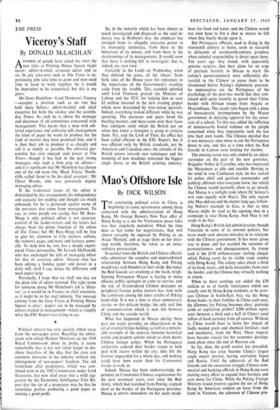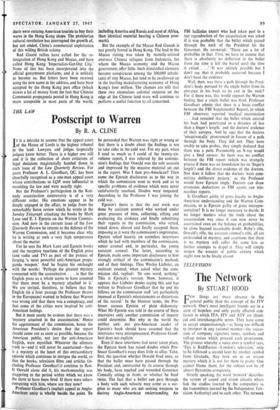Mao's Offshore Isle
By DICK WILSON
rr HE continuing political crisis in China is I beginning to cause nervousness among those concerned with the administration of Hong
Kong. Mr George Brown's New Year offer of Hong Kong as a site for Vietnamese peace talks was thus singularly maladroit. When the time does at last come for negotiations, they will almost certainly be opposed by Peking as an Asian 'Munich,' and to stage them on her door- step would, therefore, be taken as an extra- ordinary provocation.
In normal times the British and Chinese officials who administer the complex and unprecedented relationship between Hong Kong and Peking would take such blunders in their stride. But today the Red Guards are straining at the leash, neigh- bouring Portuguese Macao is having to make effusive public apologies in order to survive, and the risk of ill-considered Chinese decisions on peripheral foreign policy matters has risen with the confusion among the inner circles of Peking leadership. It is not a time to place unnecessary strains on this delicate bridge, the only real line of communication which is now left between China and the outside world.
What has happened in Macao during these past ten weeks provides an object-lesson in the art of oriental bridge-holding, as well as a remark- able example of the contrast between hysterical words and prudent actions which so often marks Chinese foreign policy. When the Portuguese authorities ordered their border troops to help deal with rioters within the city, they left the frontier unguarded for a whole day, and nothing could have been easier than for Communist troops to walk in.
Indeed, Macao has been embarrassingly de- pendent on Communist Chinese acquiescence for the past seventeen years, ever since the Red Army, which had marched from Peking, stopped short at the border of the Portuguese province. Macao is utterly deoendent on her Mont neikh-
bour for food and water, and the Chinese would not even have to fire a shot to ensure its fall when they finally decide upon it.
But Portuguese officials, used to living in the nineteenth century at home, seem to succumb to delusions of seventeenth-century grandeur when colonial responsibility is thrust upon them. Ten years ago they found, with apparently genuine surprise, that their plans for an orgy of patriotic festivity in Macao to mark the colony's quatercentenary were sufficiently dis- tasteful to the Chinese to cause them to be abandoned before Peking's diplomatic pressure. So unperceptive are the Portuguese of the psychology of the post-war world that they con- tinued until quite recently to patrol their China border with African troops from Angola or Mozambique. The recent riots began with a piece of bureaucratic incompetence by the Macao government in delaying approval for the exten- sion of a school. To this was added the infliction of unnecessarily brutal violence on the people concerned when they impatiently took the law into their own hands. The Chinese decided that it was necessary once more to cut the Portuguese down to size, and this at a time when the Red Guards in Canton were looking for victims.
The ensuing storm was only ended by an abject surrender on the part of the new governor, Brigadier Nobre de Carvalho, who has impressed the Macaonese as able and sensible. Bowing to the wind in true Confucian style, he has sacked his police chief and garrison commander and publicly affirmed what everyone knew, but which the Chinese would normally allow to go unsaid, that Macao is a twilight zone where Dr Salazar's writ runs equally with Mao's. The only reason why Mao did not end the matter long ago, follow- ing Nehru's example in Goa, is that to take Macao might be read as the opening shot in a campaign to take Hong Kong. And Mao is not ready to do that.
Hong Kong's British-led administration, though Victorian in some of its internal policies, has never made such obvious mistakes in its relations with the Chinese government. It has never given way to pique and has avoided the extremes of provocativeness and obsequiousness. Its trump card is the £150 million-a-year sterling cheque which Peking earns by its visible trade surplus with Hong Kong. The colony takes about a third of its food, water, and daily necessities from over the border, and the Chinese buy virtually nothing in return.
When to these earnings are added the £50 million or so of family remittances which are usually sent by Hong Kong residents, or by over- seas Chinese in South-East Asia via the Hong Kong banks to their families in China each year, the dilemma for Peking becomes clear; patriotic pride or capitalistic profits? £200 million repre- sents between a third and a half of China's total inflow of hard currency from all sources. Without it, China would have to halve her import of badly needed grain and chemical fertiliser, steel and machinery, from the West. These imports have become crucial for her economic develop- ment plans since the end of Russian aid.
. So far, then, the profit motive has prevailed. Hong Kong has even become China's largest single export market, having overtaken Japan and Russia. Until the upheavals of the Red Guards and the succession struggle, Chinese com- mercial and banking officials in Hong Kong were making every effort to expand their business and earn more for China. While the Peking Foreign Ministry issued protests against the use of Hong Kong by American soldiers on leave from the front in Vietnam, the salesmen of Chinese pro- ducts were enticing American tourists to buy their wares in the Hong Kong shops. The proletarian cultural revolution has interrupted the growth of, but not ended, China's commercial exploitation of this willing British colony.
Red Guard rallies have called for the re- integration of Hong Kong and Macao, and have called Hong Kong 'Imperialists-Get-Out City.' None of this has been incorporated into the official government platform, and it is unlikely to become so. But letters have been received using the new name in the address, and have been accepted by the Hong Kong post office (which makes a lot of money from the fact that Chinese Communist propaganda posted in Hong Kong is more acceptable in most parts of the world, including America and Russia and most of Africa, than identical material bearing a Chinese post- mark).
But 'the example of the Macao Red Guards is not greatly feared in Hong Kong. The lead in the Macao rioting was taken by recently-arrived overseas Chinese refugees from Indonesia, for whom the Macao economy and the Macao government offer little. Such dissatisfied elements become conspicuous among the 300,000 inhabi- tants of tiny Macao, but tend to be swallowed up in the bustling manufacturing economy of Hong Kong's four million. The chances are still that these two anomalous colonial outposts on the edge of the Chinese land mass will continue to perform a useful function to all concerned.



































 Previous page
Previous page